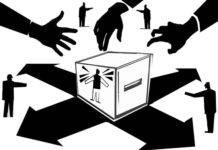BREAK CORRUPTION WITH BITCOIN’S BACKBONE

Corruption, according to the United Nations, is a $3.6 trillion industry — and business is booming. The U.N. estimates that money stolen or paid in bribes each year now tops 5 percent of global GDP. Fortunately, these abysmal statistics may be poised for a turnaround thanks to a transformational new technology: blockchain.
Originally invented to power digital currencies such as bitcoin, blockchain allows users to transfer assets or anything of value directly from one person to another without going through a bank. Instead of relying on financial institutions, blockchain transactions are validated by mathematics and computational power with extremely high levels of security and transparency.
DESPITE A POPULAR PERCEPTION THAT BLOCKCHAIN IS ANONYMOUS, THE SYSTEM IS ACTUALLY ONLY PSEUDONYMOUS, AND LAW ENFORCEMENT IS WATCHING. U.S. PROSECUTORS HAVE USED BLOCKCHAIN EVIDENCE TO SECURE GUILTY PLEAS FROM FEDERAL AGENTS WHO STOLE DIGITAL CURRENCY AND THEN TRIED — UNSUCCESSFULLY — TO COVER THEIR TRACKS.
At its core, blockchain is just a digital record — but with two important innovations. First, the system is distributed. Identical copies of the record are stored on thousands of computers around the world, and anyone on the network can see all the information entered into the system. Second, the record is permanent. Roughly every 10 minutes, new data blocks are mathematically linked into a chain — hence, the name. Information in the chain can be updated but never erased. Even if a government or corporate actor wants to, it can’t wipe out data stored on the system. Despite a popular perception that blockchain is anonymous, the system is actually only pseudonymous, and law enforcement is watching. U.S. prosecutors have used blockchain evidence to secure guilty pleas from federal agents who stole digital currency and then tried — unsuccessfully — to cover their tracks.
Put it all together, and blockchain provides a massive opportunity to improve governance around the world. Historically, official records and systems have only been as dependable as the individuals who maintain them. In most countries, a well-placed bribe can make evidence of a crime disappear or alter the outcome of bidding on a public construction project. In recent years, public frustration with such scams, always profound, has intensified, and trust in public institutions has collapsed to unprecedented levels around the world. In the most recent edition of the Edelman Trust Barometer — an annual survey of global confidence in business, government, nongovernmental organizations, and the media — only 15 percent of those polled said “the system” in their country was working.
Harnessing blockchain’s transparency and permanence could help reverse this trend. Several governments are already racing to do so by developing the next generation of blockchain-based accountability tools. In 2017, the republic of Georgia, once a warren of corruption, earned a coveted top-10 spot on the World Bank’s ease of doing business index, in part by moving some government services onto blockchain. For example, some 200,000 Georgian property titles now reside on a blockchain system that will prevent corrupt bureaucrats from manipulating real estate deals. Sweden is working on a similar system.
In October 2016, Dubai announced a goal of moving every one of its official transactions onto blockchain by 2020. Estonia, home to one of the world’s most advanced e-government systems, is transferring health records to blockchain. Last September, Ukraine started auctioning government-seized assets on blockchain as a prelude to moving the entire national government onto the system. This shift will not only help protect Ukrainian citizens from endemic public corruption but also harden government ministries against Russian cyberattacks.
Blockchain can also help improve governance in the private sector. In South Asia, the prevalence of graft has had a devastating impact on economies and ecosystems as producers engage in illegal practices — such as dumping antibiotics into fish farm water supplies — knowing they can simply buy their way out of trouble. To help solve this problem, the Tata Trusts (a multibillion-dollar charitable endowment established by India’s Tata family) is building a blockchain-based supply chain system that will track and monitor seafood through every stage of the production process. Thanks to such tamper-proof safeguards, importers and customs officials will be able to collate and review information from sensors, testing labs, and spot inspections to detect signs of malfeasance among producers, shippers, and wholesalers.
Blockchain won’t be able to solve every governance challenge. Ultimately, many solutions will depend on the quality of data that’s fed into the platform. That said, the technology already promises to provide the most powerful new anti-corruption tool to appear in decades and could help turn the battle against one of the world’s most expensive problems.
Tomicah Tillemann is a co-founder of the Blockchain Trust Accelerator at New America, chairman of the Global Blockchain Business Council, and serves on the advisory board to the to the BitFury Group, which works with the Ukrainian government on Blockchain.
The article appeared in the Foreign Policy magazine on 20/1/2018









